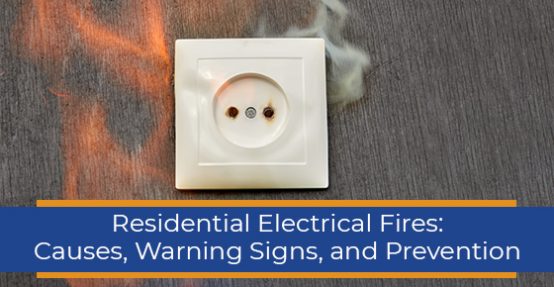
Electricity powers our lives. It provides the energy for most powered items in Canadian homes, from lights to washing machines to heating systems. It’s hard to imagine your home without electricity, yet it poses a great threat to its users through electrocution or electrical fires that may cause injury, death, and loss of property.
In Ontario, the Office of the Fire Marshall and Emergency management (OFMEM) identified a total of 863 deaths from fire between 2007 and 2016. Broken down, data identified 85 of those deaths where electricity or electrical distribution equipment was the fuel of ignition source. In fact, “since 2007, the death rate from this type of fire has increased 7% from 0.70 deaths per million population to 0.75 deaths per million population.”
Fires start in an instant and can consume your entire home in a matter of minutes because almost any material inside the house can be used as fuel: furniture, draperies, clothing, books, and so on. A fire can grow very quickly, and it’s usually not the flames that kill, but the smoke. It’s critical not to overestimate your ability to extinguish it or underestimate the amount of time needed to escape.
To keep your family and possessions safe, you need to understand the causes and warning signs of electrical fires, as well as how to prevent them.
Electrical fires account for about 6% of all cases of residential fires. Electrical fires in your home may initiate from the wiring, electrical distribution, transformers, cordplugs, meter boxes, outlets, power switching gear, surge protectors, lighting fixtures, electric fences, and electrical arcing as the source of heat.
Here are the main causes of residential building electrical fires:
This is the leading cause of residential electrical fire injuries, deaths, and property loss. Electrical malfunctions involve an interruption in the flow of an electric current or static electricity, which can be caused by:
These electrical fires can be hard to detect because the wiring is hidden in the wall. For instance, electrical wires that start in a wall can smoulder for a while, with the smoke hidden, which can delay detection. By the time someone notices the smoke, the fire may have spread considerably behind and within the walls.
The electrical demands in modern homes have increased dramatically over the last four decades, and can easily overburden an existing electrical system that has not been upgraded to meet the demand. This is a particular concern for older homes whose wiring was done about 40 years ago. Moreover, older homes are unlikely to comply with the modern electric code and safety requirements, which further increases the risk of hazardous conditions that could lead to an electrical fire.
Over time, any home can be at risk of an electrical fire as connections loosen, wire insulation ages, oil and dirt cause overheating of electrical components, and switches and receptacles wear out or come loose.
The ability of electrical fires to spread undetected increases the risk of injury and loss due to damage. Moreover, electrical fires are difficult to put out, and can increase the risk of electrocution unless the power can be properly disconnected.
To prevent residential electrical fires, you should pay attention to common indicators of electrical problems that could lead to a fire; even if it may seem like a small issue, do not ignore it. If you notice any of the following warning signs in your home, you should contact a licensed electrician in Toronto:
In addition, you should follow the following tips to prevent electrical fires:
You should hire a professional, licensed electrician to:
There are certain things that you or your loved ones do unknowingly that increase the risk of fires. Encouraging safe practices can not only keep your family and your home safe but also provide peace of mind. Here are some do’s and don’ts:
Home is the place where you expect to feel safe. But underestimating the danger of residential fires and overestimating your ability to protect your family and property can put everyone and everything you care about at great risk.
Hiring a licensed electrician in Toronto to install or maintain electronic equipment in your home. Contact Hi-Lite Electric today for an electrician you can trust.
© 2023 Licensed Electrical Installation & Service – Hi-Liteelectricinc.ca
All Rights Reserved.
Leave A Comment